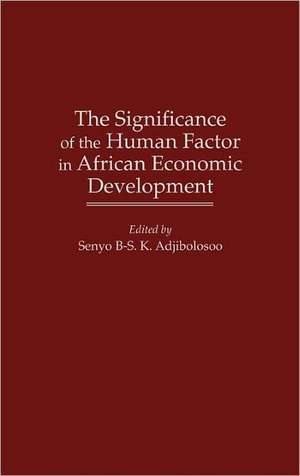The Significance of the Human Factor in African Economic Development
Autor Senyo B-S. K. Adjibolosooen Limba Engleză Hardback – 24 apr 1995 – vârsta până la 17 ani
Preț: 439.34 lei
Preț vechi: 708.63 lei
-38% Nou
Puncte Express: 659
Preț estimativ în valută:
84.13€ • 86.68$ • 70.60£
84.13€ • 86.68$ • 70.60£
Carte tipărită la comandă
Livrare economică 22 februarie-08 martie
Preluare comenzi: 021 569.72.76
Specificații
ISBN-13: 9780275948955
ISBN-10: 0275948951
Pagini: 280
Dimensiuni: 156 x 235 x 27 mm
Greutate: 0.6 kg
Ediția:New.
Editura: Bloomsbury Publishing
Colecția Praeger
Locul publicării:New York, United States
ISBN-10: 0275948951
Pagini: 280
Dimensiuni: 156 x 235 x 27 mm
Greutate: 0.6 kg
Ediția:New.
Editura: Bloomsbury Publishing
Colecția Praeger
Locul publicării:New York, United States
Notă biografică
SENYO B-S. K. ADJIBOLOSOO is Professor of Business and Economics at Trinity Western University, Langley, British Columbia. His research interests include heteroskedasticity pretesting in regression analysis, human factor development, history of economic thought, and international business and trade. He is coeditor of the book Perspectives on Economic Development in Africa (Praeger, 1994). He is currently the director of the International Institute for Human Factor Development.
Cuprins
PrefaceIntroduction: The Significance of the Human Factor in African Economic Development by Senyo B-S. K. AdjibolosooRethinking the Sources of Economic UnderdevelopmentThe Saturation Hypothesis and Africa's Development Problems: On the Nature of Development Theory and Its Implications for the Human Factor in Africa's Development by Benjamin Ofori-AmoahThe Human Factor and Maintenance of Democracy in Ghana by Kweku G. FolsonThe Media Dimension of the African Development Malaise by Wisdom J. TetteyCulture as the Epitome of the Human Factor in Development: The Case of Ghana's Collectivistic Ethic by Francis Adu-FebiriHuman Factor Engineering, Leadership Development, and UtilizationThe Significance of Leadership Development for African Government Operations by Don PageIndigenous Leadership Styles: Can Grapes Be Picked from an Orange Tree? by Claude G. MararikeLeadership and Productivity Growth: A Path for Africa by Michel M. MestreTowards Moral and Social Development in Contemporary Africa: Insights from Dangme Traditional Moral Experience by J. N. KudadjieStructural Adjustment and Manpower Utilization: The Case of Nigerian Scientists and Engineers by Chikwendu C. Ukaegbu and Christian C. AgunwambaThe Relevance of Human Resource Development: The Case of Ghana's Experience in the Agricultural Sector by Edward M. AbakahThe Human Factor in Sociocultural and Political ContextsThe Polity and the University: An African Perspective by Ali A. MazruiCultural Perspectives of Political Instability in Africa by Mike OquayeHuman Context as a Critical Factor in Effective Technology Transfer for Development by Harold HarderManagerial Practice in Privately Owned Manufacturing Industries in Nigeria and Its Implications by Chikwendu C. UkaegbuThe Human Factor in a Free-Market Open-Economy Development Model: Educational and Cultural Attitudes in Chile by David E. HojmanIndex











